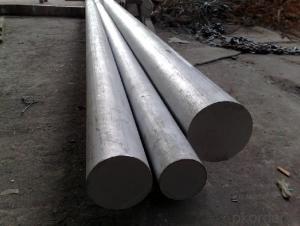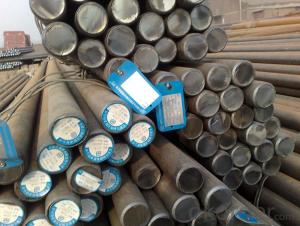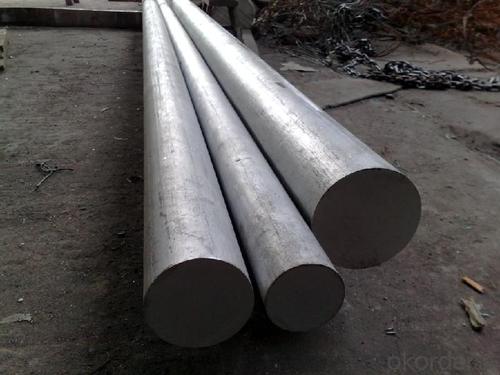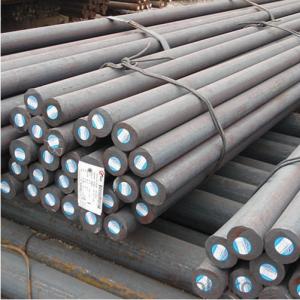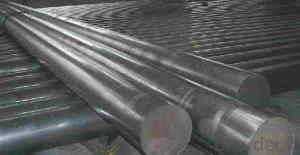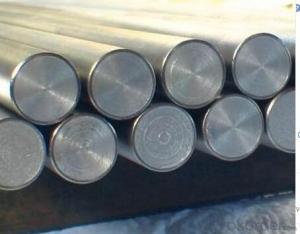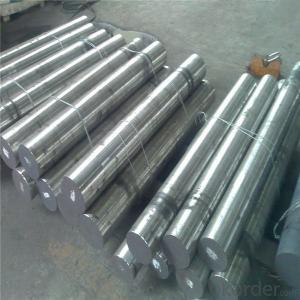Alloy Steel 100cr6/52100/GCr15/SUJ2 Bearing Steel
- Loading Port:
- China main port
- Payment Terms:
- TT OR LC
- Min Order Qty:
- 25 m.t.
- Supply Capability:
- 10000 m.t./month
OKorder Service Pledge
OKorder Financial Service
You Might Also Like
Specification
The details of our Steel
1. Produce Standard: as the GB, AISI, ASTM, SAE, EN, BS, DIN, JIS Industry Standard
2. Produce processes: Smelt Iron -EAF smelt Billet - ESR smelt Billet -Hot rolled or forged get the steel round bar and plate
3. Heat treatment:
Normalized / Annealed / Quenched+Tempered
4. Quality assurance:
All order we can received Third party inspection, You can let SGS, BV,.. and others test company test and inspect our products before Goods shipping.
Product information
Chemical Composition(GB)%
C | Si | Mn | Cr | Cu | S |
0.95-1.05 | 0.15-0.35 | 0.25-0.45 | 1.4-1.65 | ≤0.20 | ≤0.020 |
Heat Treatment
Item | Temperature ℃ | Hardness |
Anneal | 790-810 | 170-207HB |
Quenching | 830-860 | 62-66HRC |
Tempering | 150-180 | 61-66HRC |
Characterstics
1.Uniform hardness,Good abrasion resistance |
2.High contact fatigue resistance |
3.Cutting performance in general |
Applications: Used to make the load of the larger small cross-section conditioning and stress smaller large parts
Product show

Workshop show

- Q: What are the different electroplating techniques used for special steel?
- There are several electroplating techniques used for special steel, including electroless nickel plating, zinc plating, and chromium plating. Each technique offers unique benefits and properties that are tailored to the specific requirements of the special steel being plated.
- Q: How does special steel contribute to improving product efficiency?
- Special steel contributes to improving product efficiency in several ways. Firstly, special steel has excellent strength and durability properties, allowing products to withstand higher stress levels and operate reliably under demanding conditions. This enables manufacturers to design more efficient and compact products, reducing weight and space requirements. Secondly, special steel can have superior corrosion resistance, ensuring longer product lifespan and reducing maintenance needs. Additionally, special steel can offer enhanced heat resistance and conductivity, allowing for more efficient energy transfer and utilization in various applications. Overall, the use of special steel enables the production of more efficient and high-performing products across different industries.
- Q: How does special steel ensure product traceability?
- Special steel ensures product traceability through various measures and processes implemented throughout its production and supply chain. Firstly, special steel manufacturers maintain detailed records of the production process, including the source of raw materials, the specific production techniques used, and the testing and inspection procedures conducted at each stage. These records allow for complete traceability, as they provide a clear history of each product from its inception to the final product. Special steel manufacturers also implement robust quality control systems, which include unique identification codes or markings assigned to each product. These codes help in tracking the product throughout its life cycle, enabling easy identification and traceability. In addition, special steel manufacturers often rely on advanced technology systems such as barcode scanning, radio frequency identification (RFID), or blockchain to track and trace their products. These systems enable real-time monitoring and recording of product movements, ensuring accurate traceability and transparency. Furthermore, special steel manufacturers maintain strong relationships with their suppliers and customers, ensuring that the entire supply chain is transparent and traceable. They collaborate closely with suppliers to validate the origin and quality of raw materials, and they work closely with customers to provide them with detailed information about the product's manufacturing process and its journey through the supply chain. Overall, special steel manufacturers prioritize product traceability by implementing strict record-keeping systems, advanced technology solutions, and maintaining transparent relationships with suppliers and customers. These measures not only ensure the quality and reliability of the special steel products but also provide customers with assurance regarding the origin and authenticity of the product.
- Q: What are the factors that affect the weldability of special steel?
- The factors that affect the weldability of special steel include composition, heat treatment, surface condition, joint design, welding process, and welding parameters.
- Q: How does special steel perform in case hardening applications?
- Special steel performs exceptionally well in case hardening applications. Case hardening is a heat treatment process used to increase the surface hardness of a material while maintaining a tough and ductile core. Special steel, also known as alloy steel, is specifically formulated to have enhanced properties such as high strength, toughness, and wear resistance. In case hardening applications, special steel is ideal due to its ability to form a hard outer layer while retaining its core properties. The process typically involves heating the steel to a specific temperature and then introducing a carbon-rich environment, such as through carburizing or carbonitriding. The carbon atoms diffuse into the steel's surface, creating a high-carbon layer, known as the case, which significantly increases hardness and wear resistance. Special steel's high carbon content allows for deeper and more uniform case hardening compared to other types of steel. This results in improved durability, reduced friction, and enhanced resistance to wear, abrasion, and impact. The tough core of special steel also ensures that the material remains resistant to cracking or fracturing under high stress or impact loads. Additionally, special steel offers excellent machinability, allowing for ease of processing during case hardening applications. This makes it a preferred choice for various industries, including automotive, aerospace, tooling, and manufacturing, where components require both high surface hardness and structural integrity. Overall, special steel is highly regarded for its exceptional performance in case hardening applications. Its combination of high strength, toughness, wear resistance, and machinability makes it an excellent choice for producing durable and reliable components that can withstand demanding operating conditions.
- Q: What are the different certifications available for special steel?
- There are several certifications available for special steel, depending on the specific industry and application. Some of the commonly recognized certifications include: 1. ISO 9001: This certification ensures that the special steel manufacturer has implemented and maintained a quality management system that complies with international standards. It demonstrates the company's commitment to consistently providing products that meet customer requirements. 2. ISO 14001: This certification focuses on environmental management and ensures that the special steel manufacturer has implemented environmentally friendly practices in their operations. It demonstrates the company's commitment to reducing their environmental impact. 3. ASME (American Society of Mechanical Engineers) certifications: ASME offers various certifications for special steel used in pressure vessels, boilers, and other applications. These certifications ensure that the special steel meets specific quality and safety standards required by the industry. 4. PED (Pressure Equipment Directive): This certification is required for special steel used in pressure equipment in the European Union. It ensures that the steel meets specific safety and quality requirements. 5. NACE (National Association of Corrosion Engineers) certifications: NACE offers certifications for special steel used in corrosive environments. These certifications ensure that the steel has the necessary resistance against corrosion and can withstand harsh conditions. 6. API (American Petroleum Institute) certifications: API offers certifications for special steel used in the oil and gas industry. These certifications ensure that the steel meets specific quality and performance standards required for various applications in the industry. 7. ASTM (American Society for Testing and Materials) certifications: ASTM offers various certifications for special steel based on specific standards and specifications. These certifications ensure that the steel meets the required mechanical properties, chemical composition, and other criteria. It is important for manufacturers, suppliers, and end-users to consider these certifications when selecting special steel for their specific applications. These certifications provide assurance and confidence in the quality, safety, and performance of the special steel products.
- Q: What are the applications of corrosion-resistant steel?
- Corrosion-resistant steel, also known as stainless steel, has a wide range of applications due to its ability to resist rust and corrosion. It is commonly used in the construction industry for structural components such as bridges, buildings, and infrastructure, as it ensures durability and longevity in harsh environments. Additionally, it is widely utilized in the manufacturing of automotive parts, cookware, medical equipment, and aerospace components, where resistance to corrosion is crucial. The versatility and reliability of corrosion-resistant steel make it a sought-after material in various industries.
- Q: What are the properties of magnetic alloy steel?
- Magnetic alloy steel possesses several properties that make it unique and useful. It exhibits high magnetic permeability, allowing it to effectively conduct magnetic fields. This property makes it ideal for applications such as transformers, electromagnetic devices, and magnetic cores. Additionally, magnetic alloy steel has excellent mechanical strength and durability, enabling it to withstand high temperatures and resist corrosion. Its combination of magnetic and structural properties makes it a valuable material for various industrial and technological purposes.
- Q: What are the specific requirements for special steel used in the marine industry?
- Special steel used in the marine industry must meet specific requirements to ensure its suitability for the harsh marine environment. These requirements include high strength, corrosion resistance, and toughness. Firstly, high strength is crucial for special steel used in the marine industry as it needs to withstand the extreme loads and stresses experienced at sea. This strength allows the steel to resist deformation and maintain structural integrity under heavy loads, such as the weight of the ship itself or the forces generated by waves and wind. Corrosion resistance is another vital requirement for marine-grade steel. The presence of saltwater, which is highly corrosive, poses a significant challenge. Special steel for the marine industry should have excellent resistance to corrosion, preventing the formation of rust and other forms of degradation. This resistance ensures the longevity of the steel structures and reduces maintenance and repair costs. Toughness is also essential in marine-grade steel. It must be able to withstand impact and shock loads, as ships and offshore structures are constantly exposed to rough seas and potential collisions. The steel should possess the ability to absorb and distribute energy without fracturing or failing, ensuring the safety and reliability of the marine structures. In addition to these requirements, special steel used in the marine industry must also meet specific standards and certifications, such as those set by classification societies like the American Bureau of Shipping (ABS), Lloyd's Register (LR), or Det Norske Veritas Germanischer Lloyd (DNV GL). These organizations set standards for materials, construction, and inspection processes to ensure the reliability and safety of marine structures. Overall, the specific requirements for special steel used in the marine industry include high strength, corrosion resistance, toughness, and compliance with industry standards and certifications. Meeting these requirements ensures the steel's ability to withstand the unique challenges posed by the marine environment and helps ensure the safety and longevity of marine structures.
- Q: How does special steel contribute to the nuclear industry?
- Special steel plays a crucial role in the nuclear industry for several reasons. Firstly, special steel is highly resistant to corrosion and can withstand extreme temperatures and pressures, making it an ideal material for the construction of nuclear reactors and other components. This is essential for ensuring the safety and longevity of nuclear power plants. Secondly, special steel is used in the fabrication of fuel assemblies and storage containers for nuclear fuel. These containers must be able to contain radioactive material safely and securely, and special steel provides the necessary strength and durability to prevent leakage or contamination. Furthermore, special steel is utilized in the construction of steam generators, which are essential components of nuclear power plants. Steam generators transfer heat from the reactor to the turbines, generating electricity. The high temperature and pressure conditions within steam generators demand a material that can withstand these harsh conditions, and special steel fulfills this requirement. Additionally, special steel is employed in the manufacturing of control rods, which are used to regulate the nuclear reaction within the reactor core. The control rods are inserted or withdrawn to control the rate of fission and maintain a stable reaction. Special steel's mechanical properties and resistance to radiation damage ensure the reliability and effectiveness of control rods. Moreover, special steel is used in the construction of shielding materials and containment structures that protect workers, the environment, and the general public from radiation exposure. These structures are designed to prevent the release of radioactive materials and are made with special steel due to its excellent radiation shielding properties. In summary, special steel contributes significantly to the nuclear industry by providing the necessary strength, durability, and resistance to corrosion, heat, and radiation. It enables the safe and efficient operation of nuclear reactors, the storage and transportation of nuclear fuel, and the protection of personnel and the environment.
Send your message to us
Alloy Steel 100cr6/52100/GCr15/SUJ2 Bearing Steel
- Loading Port:
- China main port
- Payment Terms:
- TT OR LC
- Min Order Qty:
- 25 m.t.
- Supply Capability:
- 10000 m.t./month
OKorder Service Pledge
OKorder Financial Service
Similar products
Hot products
Hot Searches
Related keywords
